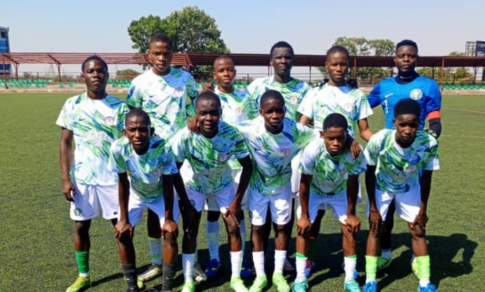The third edition of the Talent Development Scheme (TDS), a joint football development initiative by FIFA and the Nigeria Football Federation (NFF), has officially kicked off in Abuja, with 39 players already in camp.
The players arrived on Monday, June 30, 2025, and began training the following day. National Coordinator and Technical Director, Nasiru Jibril, expressed delight at the smooth start and player enthusiasm.
“Day one was really good,” Jibril said. “We already have 39 players in camp, and four more are expected to join.”
Coach Patrick Bassey, Head Coach of the Future Eagles and the TDS program, praised NFF President Alhaji Ibrahim Musa Gusau—who also serves as WAFU B President—for his unwavering support and commitment to grassroots football.
“This third edition is already showing great promise. The players are of the right age, carefully selected, and have what it takes to progress. I believe we’re seeing future national team representatives,” Bassey said.
He noted that the program has expanded significantly:
“Before, it was one-sided. Now, it’s spread across six geopolitical zones and 11 venues. People ask how players are selected, this new format provides the answer. We’re reaching talents across the country.”
The Abuja camp will run for two weeks, with the first week dedicated to newly invited players and the second week to returning players, including those who featured in Morocco and earlier camps. A total of 36–37 players are expected in the second batch.
After Abuja, the TDS program will embark on a nationwide scouting tour across Nigeria’s six geopolitical zones. Five of the six zones will be split into sub-zones to improve accessibility. The Southeast will retain a single venue. The proposed zonal structure includes:
- Northwest A: Kebbi, Sokoto, Zamfara (Venue: Kebbi)
- Northwest B: Kano, Katsina, Kaduna, Jigawa (Venue: Jigawa)
- North Central A: Plateau, Nasarawa, FCT, Benue (Venue: Plateau)
- North Central B: Kwara, Kogi, Niger (Venue TBD)
- South South A: Bayelsa, Rivers, Akwa Ibom (Venue: Bayelsa)
- South South B: Edo, Delta, Cross River (Venue: Edo)
- Southwest A: Lagos, Ogun, Oyo (Venue: Oyo)
- Southwest B: Osun, Ekiti, Ondo (Venue: Osun)
- Southeast: All southeastern states (Venue: Enugu)
Each zone will eventually select standout players to form representative teams. These six zonal teams will then compete at a national inter-zonal championship.
Returning player Kunle Tokode praised the intensity of the camp:
“Everyone is putting in effort, and we’re gelling. Playing for the national camp brings pride—you push harder because you're running for your country. It brings more hunger.”
Yahaya Habeeb Adisa, another player from the first batch, echoed this sentiment:
“It’s been a good camp. I’m proud Nigeria has created this kind of program for us. The environment, the intensity—it builds confidence and sharpens your skills.”
Both players lauded the TDS initiative, urging its continuity to help restore Nigeria’s prominence in youth football.
Nasiru Jibril clarified that the TDS is a developmental project, not a national team assignment:
“We’re here to discover and nurture talent while building a reliable database that prevents age cheating. Every time we bring in these boys, we discover new, talented players.”
Now in its third year, the FIFA/NFF Talent Development Scheme continues to grow in scope and impact, cementing its place as a cornerstone in Nigeria’s long-term football development strategy.








ADD A COMMENT :